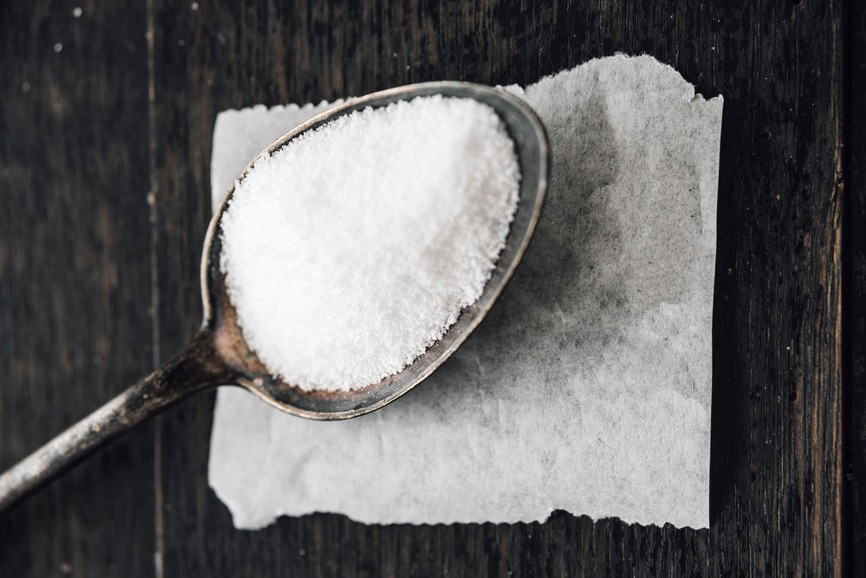Wait, Is Stevia Actually a Healthier Alternative to Sugar?
This alt-sweetener, which is technically an extract from the stevia rebaudiana plant, is natural, zero cal, and has a much more potent flavor than sugar. (If you're subbing it into a recipe, you only need to use an eighth of the sugar amount.) And unlike cane sugar, it's readily available not only in crystal form, but as liquid, too. So does that mean you can add it into your almond milk latte with blind abandon? Well, maybe. It turns out the answer is more complicated than a simple yes or no.
Here, two experts weigh in on whether stevia is actually healthy. Their differing opinions prove that coconut oil isn't the only health food whose wellness cred is up for debate—and their arguments go way beyond just calories and glycemic index count.
Keep reading for the truth about stevia.

Stevia is a safe alternative to sugar, but eat it in moderation.
When stevia went mainstream, Kelly LeVeque, celebrity health coach, holistic nutritionist, and author of Body Love did her homework. "When I was told it was a leaf, I thought, yeah, well, so is cocaine. What is it?" she says. For her, its natural status wasn't enough to make it safe, so she looked into scientific research. What she found was encouraging."What I look for is, does it elevate glucose or insulin? How does it compare to sugar? And what I found was that stevia does not cause elevation, which is encouraging when it comes to diabetes and other blood sugar-related issues," she says. "I do think it's a clean alternative for people who typically [use] sugar in their coffee."
While LeVeque says the alt-sweetener is safe, she notes it's important to stick with organic stevia as opposed to Truvia, a popular brand that includes sugar alcohol (which can cause digestive distress in some people) and natural flavors (which may not be so natural). And she also doesn't recommend using it several times a day, since it's basically training your brain to continue craving treats.

{{post.sponsorText}}
"Every time you have something sweet, it's rewarding—and there's a release of dopamine in the brain. So having a sweetened smoothie in the morning could make you crave a brownie in the afternoon," she says. In other words, save it for your most treasured beverage or meal of the day. (Like, say, your morning coffee.)
There's evidence that Stevia causes gene mutations—and that there may be safer alternatives to use
John Pezzuto, PhD, afood and drug researcher and dean of Long Island University College of Pharmacy was first introduced to stevia in the late '80s—before it was approved as a food additive by the Food and Drug Administration. "I was working with a team that wanted to use natural sweeteners and one of these was stevia," he says. "My job was to test the products to see if they were mutagenic, to give an idea about safety."
Pezzuto says what he found surprised him: Stevia interacted with DNA, mutating the genes. (Yes, for real.) So how did it get FDA approved? Despite the mutating genes, there have been no studies showing that stevia causes cancer or any other health problems when tested on rats. "Mutating genes don't necessarily cause cancer, but as far as I'm concerned, I wouldn't necessarily eat something that [impacts DNA] when there are alternatives," he explains.
So what sugar alternative does Pezzuto feel safer using? Interestingly enough, he turns to something artificial: sucralose. (AKA the main ingredient in Splenda—which, by the way, has been shown to have its own problems). "A lot of people think 'natural' means 'good,' which is beyond ridiculous," he says. "Some of the most toxic substances on earth are natural products. And likewise, just because something is artificial doesn't mean it's bad. Sucre, for example, doesn't cause a gene mutation." Sure, he's familiar with some of the other options out there, like monk fruit, but Pezzuto says he prefers the taste of sucralose—and, since he considers it safe, that's what he opts for. And you know how stevia is sweeter than sugar? That might not actually be a good thing, since what you're getting is almost a concentrated flavor; scientists have found that it still causes cravings.
There is something the two experts agree on, however: More long-term testing needs to be done to determine whether stevia's really the star sweetener it's often made out to be. "Stevia has been used in South America for 1,500 years without any [known] side effects, but we don't really know unless something is strictly studied," LeVeque says. "There haven't been any studies yet that cause me to be concerned, but I'm always cognizant and looking for more."
This post was originally published June 28, 2017. Updated on September 4, 2019.
The sweetener game can be hard to navigate, so here are the pros and cons of some other sugar alternatives. Plus, low-glycemic index desserts to enjoy tonight.
Loading More Posts...